Bahá’í Community News
Regional Conferences of the Five Year Plan
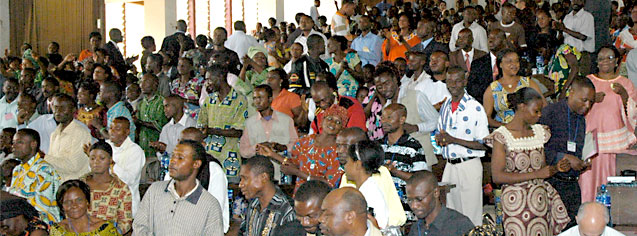 More than 1,000 Baha’is from the Democratic Republic of the Congo and Angola gathered
in Lubumbashi. More photographs
More than 1,000 Baha’is from the Democratic Republic of the Congo and Angola gathered
in Lubumbashi. More photographsand video
The Lubumbashi Regional Conference
22–23 November 2008
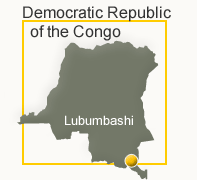
“I really felt the presence of God here at this conference. I had goose bumps the entire day, and I said to my friend, ‘You see, God is here with us.’ The thing that really touched me was when the representatives of the House of Justice spoke about crisis and victory. Crisis in the sense of the crisis we see in the world around us, and it is us, the Baha’is who hold the victory in our hands.”
Peggy Simbi’s sentiments reflected the spirit that brought together more than 1,000 Bahá’ís on 22-23 November in Lubumbashi, the second such conference in the Democratic Republic of the Congo in nine days. The conference would enable the Congolese and Angolan Bahá’ís to celebrate their successes at this midpoint of the current Five Year Plan and to re-consecrate their energies to achieve an accelerated rate of growth over the next six months.
People came from seven provinces of the DRC, and nine Bahá’ís undertook the trip from Angola. Heavy rain made travel difficult; nonetheless 930 were registered by 10 a.m. on the first day. Lushiku Lushiku, like many others, overcame a series of obstacles in making the trip. “Even though I don’t have money, regardless of my state of poverty, I decided to leave all my activities behind,” he recounted. “I got permission from the director of the school where I teach, to travel. So I borrowed a little money and left my village of Lushiku heading for Kananga using a very disorderly bicycle. I was all alone on this trip but God gave me courage to serve Bahá’u’lláh. The first night I slept in an outdoor restaurant because I didn’t know anyone in that village. The next morning I continued all day and then spent another night with nowhere to sleep. At 4 in the morning, I started out again for Kananga and there I caught the flight to Lubumbashi.”
“I don’t know how to explain my joy, but I must say that I have a lot of work ahead of me as a Baha’i.”
Hans Ilunga Mangenda, age 15
Mrs. Rachel Ndegwa, who with Mr. Stephen Hall represented the Universal House of Justice, opened the conference Saturday morning with an address that set the tone and focus for the weekend. Reports from two National Spiritual Assemblies, Democratic Republic of Congo and Angola, and four Regional Councils – Katanga, Congo West, Eastern Kasai and Western Kasai – described the impact that the Five Year Plan has had on the growth of the Faith and the development of the community.
The capacity of the friends in DRC was immediately apparent from the quality and content of the reports. One of the presenters highlighted the influence of the Cause when he described a teaching effort in one cluster that received an unexpected boost from a priest who announced on the radio that if people wanted to pray sincerely to God they should follow the Bahá’ís. Within the first two days of the initiative, 56 people decided to join the Bahá’í community.
Prior to the conference, intensive consultations among the Counselors, the National Assembly, Regional Councils, and workshop facilitators had identified key issues for discussions among the participants, including:
- how to sustain cycles of growth, meeting the needs of those who have enrolled and those who wish to join the Bahá’í community, through encouragement and perseverance,
- improving the quality of learning, especially in the way that the Bahá’ís reflect together on their efforts to conduct children’s classes, study circles, activities for youth and devotional gatherings and to share the teachings of the Faith with receptive souls,
- strengthening the bonds of unity among the institutions and friends,
- recognizing the critical importance of faithfulness to the principles, teachings and laws of the Faith and the decisions of the institutions.
The participants took up these issues, and others, in their consultations on the second day when they broke into small groups to consult together on their service in different areas of the DRC and Angola.
In addition to the two counselors, Mrs. Ndegwa and Mr. Hall, from the International Teaching Center, there were in attendance three Continental Counselors, Albert Nshisu from the DRC, Chungu Malitonga from Zambia, and Sinuhé Lozano from Equatorial Guinea. One of the Counselors reported, “The love of the friends for the Universal House of Justice has been at the center of deliberations.”
The first day heard messages from the House of Justice, praising the accomplishments of the Congolese community, one of several national communities laboring in the forefront of Bahá’í activity worldwide. Clear guidance on how to improve the quality of actions taken in the context of the institute process, described as the “engine of growth,” was also provided. The friends were urged to “cherish their unity.” In the workshops organized to study the 20 October 2008 message from the House of Justice as well as the specific message to the conference, the friends explored further the responsibility they have toward all of humankind.
“What really moved me about this conference was the new vision that we have been given,” explained Baron Ntambwe Binichini. “We should no longer only be thinking about our own cluster, but we also need to have a global vision and help other clusters also to launch their intensive programs of growth.”
“We should no longer only be thinking about our own cluster, but we also need to have a global vision and help other clusters also to launch their intensive programs of growth.”
Baron Ntambwe Binichini
“Being a Baha’i teacher is not something we do just for ourselves,” said Charlotte Kilenge, “but rather for the whole world. We must also teach not only through words, but through our actions, to have an influence on the world around us. We must dedicate ourselves to the core activities as they are the saving grace of the world.”
Two youth choirs, strategically positioned in the middle of the seating, periodically broke into song and elevated the already celebratory atmosphere. The quality of the choirs, comprising some 200 youth from Lubumbashi, was “absolutely magnificent, lifting the roof and the atmosphere to new heights of happiness and joy,” said one participant.
There were enthusiastic responses to accounts of personal experiences. One presentation that particularly moved the participants came from a youth who had organized a junior youth group from a poetry club she had started. She highlighted the particular needs of junior youth, those aged 11-15 years, pointing out that overbearing authority was not effective with this age group and that what was needed was to befriend and love them. She told of how in the beginning these youth were always at odds with each other but learned over time how to cooperate and collaborate.
The evening cultural program celebrated the achievements of the Five Year Plan. The friends expressed their love for Bahá'u'lláh through spirited singing, dancing, drama and prose.
A new goal was set for the region (DRC and Angola) of launching intensive programs of growth in 24 priority areas by Ridván 2009, 23 of which are in the DRC. Day 2 of the conference focused on devising plans to achieve this objective, with many participants making commitments to undertake activities in the priority areas while continuing to support the expansion and consolidation work in their own clusters.
Comments from participants
 Hans Ilunga Mangenda, age 15: “I don’t know how to explain my joy, but I must say
that I have a lot of work ahead of me as a Baha’i. I want to go now and help consolidate
all the new Baha’is.”
Hans Ilunga Mangenda, age 15: “I don’t know how to explain my joy, but I must say
that I have a lot of work ahead of me as a Baha’i. I want to go now and help consolidate
all the new Baha’is.”
 Mayika Mansweki: “In some areas we had some hesitation about launching our intensive
programs of growth, but by hearing about other’s experiences and with the encouragement
of the members of the International Teaching Center and the other institutions,
our resolve has been reinforced.”
Mayika Mansweki: “In some areas we had some hesitation about launching our intensive
programs of growth, but by hearing about other’s experiences and with the encouragement
of the members of the International Teaching Center and the other institutions,
our resolve has been reinforced.”
 Rosalie Kimpanga: “It was a great joy to come here to the conference. It will help
us to accelerate the work of the clusters because we have learned so many things
here, and gained a lot of experience and as I am the Institute coordinator, I will
be dedicating even more effort, based on what I have learned here, to advancing the
work of the clusters in Kinshasa.”
Rosalie Kimpanga: “It was a great joy to come here to the conference. It will help
us to accelerate the work of the clusters because we have learned so many things
here, and gained a lot of experience and as I am the Institute coordinator, I will
be dedicating even more effort, based on what I have learned here, to advancing the
work of the clusters in Kinshasa.”
 Lushiku Lushiku: “I was full of emotion to learn that there was a Regional Conference
to be held in Lubumbashi. So I took the decision that I would go. … But in spite
of the suffering, I am so happy to have come to this conference because it has given
me another experience and has been a great encouragement, something I will share
with the friends when I go home.”
Lushiku Lushiku: “I was full of emotion to learn that there was a Regional Conference
to be held in Lubumbashi. So I took the decision that I would go. … But in spite
of the suffering, I am so happy to have come to this conference because it has given
me another experience and has been a great encouragement, something I will share
with the friends when I go home.”
 Peggy Simbi from Lubumbashi: “I really felt the presence of God here at this conference.
I had goose bumps the entire day, and I said to my friend, ‘You see, God is here with
us.’”
Peggy Simbi from Lubumbashi: “I really felt the presence of God here at this conference.
I had goose bumps the entire day, and I said to my friend, ‘You see, God is here with
us.’”
Video: Singing, workshops and more.
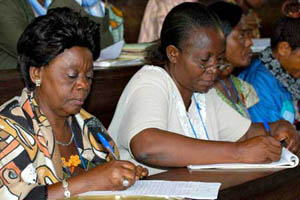
Seven provinces of the D.R. Congo were represented at Lubumbashi, which hosted the second conference in as many weeks in that country. The first conference was in Uvira.
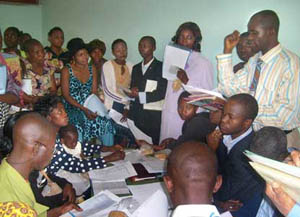
Workshop sessions, which give an opportunity for individual participation, are held on both days of every conference.
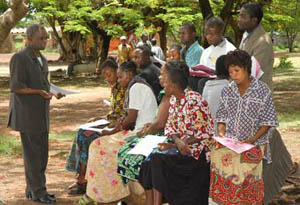
A facilitator works with a break-out session to study two letters from the Universal House of Justice.
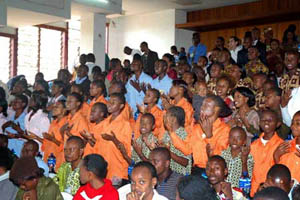
Two youth choirs, strategically positioned in the plenary sessions, periodically broke into song.
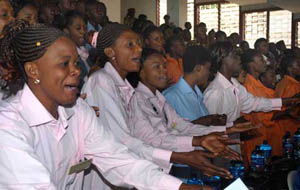
Music elevated the already celebratory atmosphere.
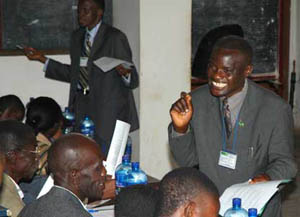
Faustin Mulebeka of Eastern Kasai in D.R. Congo, a member of the Baha’i Regional Council, facilitates a workshop.
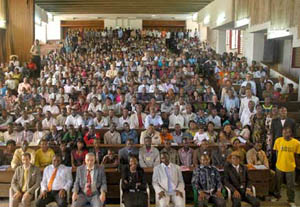
Participants at Lubumbashi pose for a conference photo. French was the main language for the event, but Portuguese translation was provided for the Angolans.
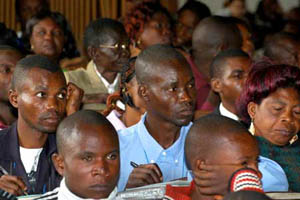
Lubumbashi was one of nine cities in Africa that are hosting conferences in the series of 41 planned by the Universal House of Justice.
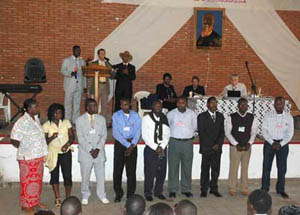
Baha’is from Angola, which borders D.R. Congo to the southwest, are pictured here during the conference.
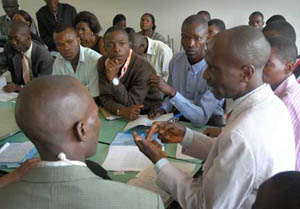
Participants at all the conferences are now receiving a personal planning form to fill out if they so choose. Shown here is one of the workshop sessions in Lubumbashi.









